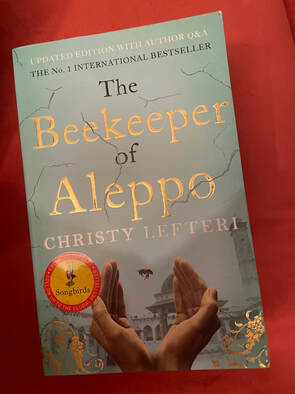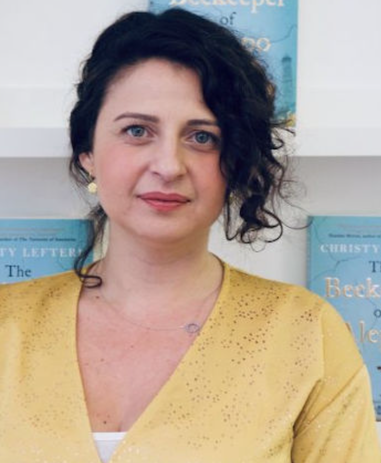Book Review of The Beekeeper of Aleppo by Christy Lefteri

Christy Lefteri’s The Beekeeper of Aleppo is a powerful account of the lives of a young couple who lived a simple, but comfortable life in Aleppo, Syria, surrounded by friends and family. Afra was an artist who painted in the mornings, while Nuri went to work, as a beekeeper, with his cousin Mustafa in the mountains.
We quickly learn of the traumas both families undergo in war-torn Syria and after the deaths of the sons of Nuri and Mustafa respectively, the families decide to seek a safe life in the UK. Mustafa leaves first and makes it to Yorkshire where he became a teacher of beekeeping to other immigrants. Nuri, and his reluctant wife, Afra, follow, The use of emails in internet cafes between Mustafa and Nuri provides an outlet for the reader to gain insight into Nuri’s emotional state.
The Beekeeper of Aleppo is about both physical and psychological trauma caused by war, family loss, abuse and dislocation. The balance of the relationship between the central couple Nuri and Afra changes as the story progresses. As the reader looks in on their life experiences, we notice both the impact of not only the horror of what the refugees undergo, but also the impact of small kindnesses shown to them. Through this the reader gains insight and understanding about the real-life plight of thousands of people in similar situations to these fictionalized characters.
The unexpected revalation towards the end of The Beekeeper of Aleppo (which I’ve talked about in My Personal Response, so don’t read if you’ve not finished the book,) demonstrates the immense skill and craft of writing demonstrated by Christy Lefteri.
Bookclub Questions on Lefteri's The Beekeeper of Aleppo
- Who do you think is the stronger character, Nuri or Afra?
- Why do you think Nuri wanted to stay in Syria at the start of the novel?
- What did you take away from the Beekeeper of Aleppo?
- How true do you think Nuri’s account of what happened was?
- Has reading this book changed your perception of refugees? If so how?
- What does being a beekeeper symbolize for different characters in the Beekeeper of Aleppo?
- What do you predict will happen to the characters in The Beekeeper of Aleppo after the story has ended?
- Which character do you feel most empathy for and why?
- If you were producing or directing a film version of The Beekeeper of Aleppo who would you choose to play the main roles?
- What did you find the most distressing incident in The Beekeeper of Aleppo?
- Why does Nuri feel he is not worthy of Afra’s forgiveness once in the UK?
- Explore the trauma of the journey Afra and Nuri made to England. What horrified you the most?
- Did you think of The Beekeeper of Aleppo as fiction or a fictionalised representation of truth? Thinking about that now how does it affect your response to the novel?

Book Club Questions on The Beekeeper of Aleppo (If you haven't read the book!)
- Assuming this isn’t your personal situation, how do you think you would respond if you found yourself living in a dangerous war-torn country? If you have been in this situation and think this is an insensitive question, let me know and I’ll remove it from the blog.
- Christy Lefteri’s book shares a powerful political and social message about the crisis associated with refugees and immigrants. If you were to write a novel to make a social or political issue, what would you choose to write about and why?
- Syria has suffered so much, due to civil war and now (at the time of writing -February 2023) the appalling earthquake. These terrible tragedies run alongside individuals’ getting on with their own day to day lives. How do you reconcile the two? Discuss.
Personal Response to The Beekeeper of Aleppo
The thing that makes Christy Lefteri’s great book stand out for me, is the focus it places on the psychological trauma that Nuri and Afra have undergone and continue to go through as they escape the Syrian war and make their long, arduous journey to England. For much of The Beekeeper of Aleppo Lefteri encourages the reader to focus on Afra’s blindness, as we see Nuri support her the best he can. It took me an age to figure out that Mohammed is a figment of Afra’s imagination, which puts the rest of his narration in question. Pure genius on the part of Lefteri.